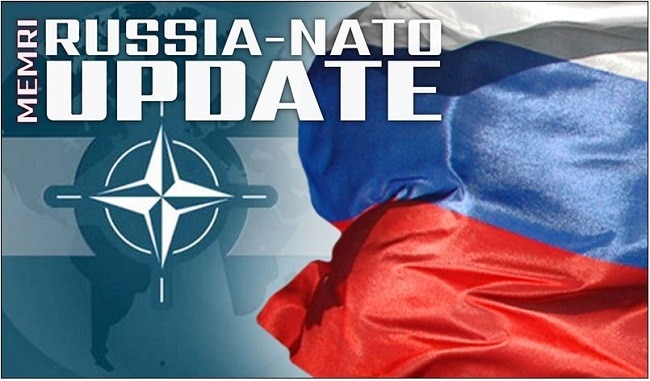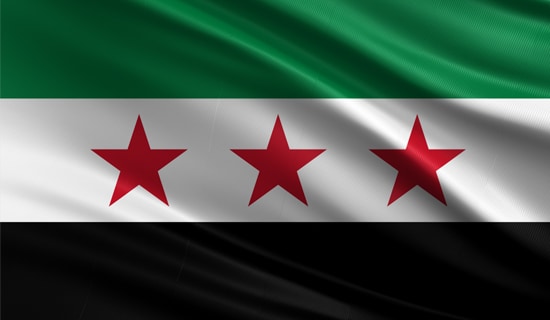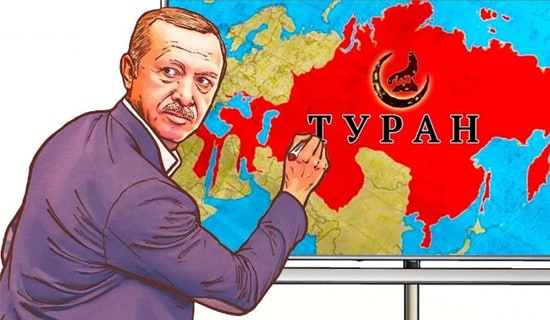Russia-NATO Update is a new monthly review by the MEMRI Russian Media Studies Project, covering the latest news on Russia-NATO relations from the Russian and East European media.

Photo Of The Month:

Painted on the car's hood: "Good-bye America" (Source: Vk.com/s_mayonezom)
Quotes Of The Month:
Russian Ambassador to NATO Alexander Grushko said: "Currently, [Russia-NATO cooperation] is halted, kept frozen in the fridge, and there are no signs that NATO is ready to renew the cooperation, though many in Europe understand that such cooperation is mutually beneficial and improves the security situation."
(Ria.ru, March 20, 2017)
Grushko said: "This [NATO's plans to bolster its presence in Black Sea] is yet one more attempt to prove that NATO will ensure its security by deploying additional forces... This is absolutely meaningless since any attempts to pump in arms to the Eastern Flank as well as reinforcing it, will only worsen the regional security."
(Ria.ru, March 20, 2017)
Grushko said: "The Alliance has already declared that it pursues the policy of deterring Russia, which has some 'aggressive plans' and 'tries to enhance its self-esteem.' That's why, [NATO] needs all kinds of horror stories to justify this demonic picture assigned to our country… It was NATO which moved its own borders [eastwards], including getting into the range of our firepower. Now, they are on alert because some NATO countries territories are in the kill zone."
(Ria.ru, March 20, 2017)
Grushko commented: "In this field [fighting terror] NATO's resources are scarce, since the fight against terror implies not only military force but a far more extensive set of instruments, which NATO lacks."
(Ria.ru, March 20, 2017)
Grushko said: "What we see is that the leading voices in NATO are the so called 'frontier states,' which claim that they are 'in the firing line' and need to be defended by rotational and permanent deployment of foreign troops and by creating military bases. This is the way back to the Cold War era."
(Ria.ru, March 20, 2017)

Russian Permanent Representative To NATO Aleksander Grushko (Source: Missiontonato.ru)
March 30, 2017 - First Ambassadorial Meeting Of The Russia-NATO Council
Commenting on the results of 2017's first ambassadorial meeting of the Russia-NATO Council, Russian Ambassador to NATO Alexander Grushko said: "It is not possible to build confidence until NATO abandons its military domination policy." He then added: "Representatives of NATO countries have emphasized the importance of the Vienna document on confidence-and security-building measures as well as other arms control mechanisms. But they were unable to answer the question how to combine that with their policy aimed at restraining Russia and demonstrating their military capabilities near our borders."
Grushko also said: "I don’t want to diminish the importance of such briefings, but they are not enough to improve the security situation. Dialogue for the sake of dialogue will not produce any results if no specific decisions are made and no steps are taken."
(Tass.com, March 30, 2017)
The Russian daily newspaper Kommersant published a more extensive version of Grushko's remarks:
"If we talk about the political meaning [of the contacts], all of us understand that Russia and NATO are two main factors which define the state of military security in Europe. It would not be wise not to have contacts with them [NATO representatives]. It would be very dangerous. Thus, we should never underestimate the importance of such an exchange of information. The briefings help to understand the logic of military –political decisions taken, they help to understand the direction the organization [NATO] evolves and in general works in favor of de-escalation.
"Having said that we should of course overestimate the importance of all that [exchange of information, briefings contacts]… if NATO countries are really interested in de-escalation, then we should talk about stopping the process of strengthening the east flank and about dismantling of the current deployment [in Poland], which is justified by an illusory 'Russian military threat'…
"Many in the West are still unprepared to comprehend the new reality, in which the West is not the only factor defining the course of foreign policy processes – there are other players (first of all Russia), which are able to play a leading role in stabilizing the situation in various regions of the world. They [the other players] are already playing this leading role. Yet, many countries find it difficult to reconcile themselves with the reality of a multipolar world."
(Kommersant.ru, April 1, 2017)
March 31, 2017 – NATO Meeting At The Foreign Ministers Level
The Russian Foreign Ministry commented as follows the NATO meeting at the level of Foreign Ministers on March 31, 2017:
"On March 31, a North-Atlantic Council meeting at the level of foreign ministers took place in Brussels. It was convened ahead of time to fit in with U.S. Secretary of State Rex Tillerson’s tight schedule. The U.S. Secretary of State’s presence was needed for a joint confirmation of the strength of the transatlantic bond, which some members started to doubt after the new U.S. administration came to power.
"It seems that it is no easy task to maintain unity in the ranks of a multilateral structure, especially one consisting of very different states, like NATO. It is important to have a strong team-building theme. It did not take NATO ministers long to find just such a theme. According to their own comments, they always have the same thing on their minds: the 'Russian threat' myth, the 'Russian aggression' slander and endless entreaties to collectively resist this aggression.
"U.S. Secretary of State Rex Tillerson’s respective statements are bewildering. We state with regret that these declarations were made a day after the Russia-NATO Council meeting at the level of permanent representatives, which, according to NATO Secretary General Jens Stoltenberg, featured 'a thoughtful discussion of a wide range of issues in an open and positive atmosphere.' Apparently, this statement had nothing to do with the voodoo dance that followed in the private NATO circle.
"In this connection it is important to bear in mind the Russia-NATO Council meeting’s agenda: each side reported on its defense plans, NATO representatives pursued the issue of 'increasing the predictability of military activities' and regional topics were discussed.
"This begs the question: how could the relationship between Russia and NATO be constructive when the alliance keeps behaving in line with the old models and when the United States and their allies are fixated on the idea of building up their military presence on our borders justifying it with the need to 'contain Russia'? In fact, they impose the confrontational model of relations on us, relations based on military confrontation. At the same time, we cannot see any signs of the alliance’s intention to restore practical cooperation in areas of common interest, or to move in the direction of tackling real challenges to security, including regional terrorist threats.
"Once again NATO has placed its ideological dogmas above real efforts to address global problems. There can be only one conclusion: only a radical transformation in the nature of the alliance that is hopelessly stuck in the past can pave the way to positive change in European security."
(Mid.ru, March 31, 2017)
February 15-16, 2017 - Meetings Of NATO Ministers Of Defense
Following the meeting of NATO Ministers of Defense on February 15-16, Kommersant published an interview with the Russian Ambassador Grushko:
Q:"What conclusions should Russia draw after the meeting of the North Atlantic Council at the level of Defense Ministers?"
Grushko:"We can draw two conclusions:
"First, the U.S. gave a firm warning that further American support for NATO will be conditional on whether other countries increase their financial contributions, and reaching the 2% target will be required sooner than anticipated. As can be deduced from the alliance leaders' statements, the May 25th NATO summit may consider commitments by the member countries to national plans for meeting this standard.
"Second, the meeting was marked by new decisions concerning NATO's southeast region. A multinational brigade is to be established around an existing Romanian brigade. Eight countries announced their participation in the brigade level headquarters, five countries will provide additional ground and air support for the brigade. On a par with this is the decision to increase NATO's naval presence in the Black Sea. This is another step bound to increase tension in regions that affect Russia's vital interests.
"Obviously, we will take all necessary measures to make sure that Russia's interests in the region are properly safeguarded. If we are to draw political conclusions, we can say that NATO is continuing its policy of strengthening its eastern flank and trying to impose a confrontational agenda on us, at the time when real needs call for a concerted effort to combat new threats. Without a positive agenda it will be difficult to find any points of convergence."
Q:"What, in your view, has changed as a result of the budget discussion that began at this meeting, as well as the overall tough stance of the new U.S. administration?"
Grushko:"The assertion of NATO's weakness and the requirement to increase military spending up to 2 percent, all this is just a part of the myth making about the Russian threat. However the numbers speak for themselves. The military budgets of the European member countries of NATO put together amount to 250 billion euros. This is greater than the combined military budget of Russia and China.
"If you look at the real security needs, this is definitely more than enough. The real danger is that it is not only spending that is supposed to be increased, but also the purchasing of weapons, and substantially so. If these plans are carried out, we can easily find ourselves in a Cold War situation, when the military planning itself, focused on confronting the major enemy, will generate the corresponding policy. This is the danger of falling into a vicious circle, from which it is very hard to exit. In fact, the entire history of the Cold War is a story of military planning and politics, while mutually influencing each other, leading to a situation where the price of peace in the Cold War proved unaffordable for everyone.
"In any case, we have no choice but to react to the negative changes in the military build-up of the alliance. Obviously, this is a long-term proposition. This is not just the rotation of four battalion groups [in Poland and the Baltic countries], or the rotation of the American brigade in Eastern Europe. Efforts are being made to upgrade the military infrastructure, increase the capacity of airfields, create additional headquarters -- all this, of course, threatens the Russian Federation.
"I still think that sooner or later the European countries will become fully aware of their real security interests. The normal healthy relationship with Russia would of course provide the best security guarantees. Speaking about the allocation of resources, many believe, taking into account the information coming from various NATO-related sources, that we should not think about purchasing F-35 jets or tanks, but rather about enhancing law enforcement structures and information systems that will improve the data exchanges. The migrants issue requires significant financial resources, this is quite clear. I believe this will be one of the factors that will influence the discussions if not within NATO, then in Western society as a whole..."
Q:"... For the French with the presidential campaign in full swing, the increase of their military spending up to these 2 percent is also hardly a boon. Even if they are closer to the bar..."
Grushko:"Only two European countries are capable of conducting remote operations - Britain and France, the rest are not quite capable in this respect. Although we simplified that task for them, as thanks to Russian efforts, there are no more mountains of weapons that used to be found in Central Europe, and the very pattern of confrontation no longer exists.
"I don't mean to say that it is a shame, but paradoxically, all the efforts that have been made to get rid of the material legacy of the Cold War are now essentially in doubt. When security from the position of strength (that is, when every force is being responded to by a counterforce, and again [elicits] a counterforce etc.) was replaced by an understanding that arms control as such can be an important security tool that takes into account each other's legitimate security interests. NATO is now turning its back on this and returning to power schemes for security. Similar to a centipede, can you imagine how long it will take to reverse course again?"
(Kommersant.ru, February 27, 2017)





